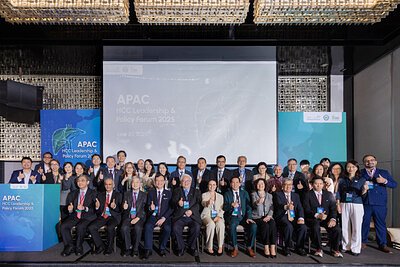
Asia-Pacific Nations Unite to Tackle Rising Liver Cancer Rates – But Pharma's Role Draws Scrutiny
A new regional roadmap aims to improve liver cancer outcomes across Asia-Pacific. But concerns are rising over the influence of pharmaceutical funding and potential conflicts of interest.
Asia-Pacific Nations Unite to Tackle Rising Liver Cancer Rates – But Pharma's Role Draws Scrutiny
By Daniel Howard | November 06, 2025
Taipei, Taiwan – Health officials and experts from across the Asia-Pacific region convened in Taipei this week to address a growing public health crisis: the rising incidence of liver cancer. The meeting, hosted by the APAC Liver Disease Alliance, culminated in the launch of a new “Roadmap” for hepatocellular carcinoma (HCC) surveillance and management, a collaborative effort intended to standardize care and improve outcomes across a region bearing the highest burden of this deadly disease.
While the initiative has been lauded by many as a crucial step forward, concerns are mounting over the financial ties between the APAC Liver Disease Alliance and major pharmaceutical companies, raising questions about potential conflicts of interest and the true priorities driving the roadmap’s recommendations.
A Region in Crisis
Liver cancer is the third leading cause of cancer-related deaths in the Asia-Pacific, accounting for over 55% of global cases. Factors contributing to the high prevalence include chronic hepatitis B and C infections, aflatoxin contamination in food, and increasing rates of non-alcoholic fatty liver disease linked to changing lifestyles. China alone accounts for roughly half of all new liver cancer diagnoses worldwide.
“The scale of the problem is immense,” explained one regional health official, speaking on condition of anonymity. “We're seeing patients diagnosed at later stages, reducing their chances of survival. A coordinated, regional approach to screening and treatment is desperately needed.”
The newly unveiled roadmap focuses on several key areas: standardized surveillance protocols for high-risk populations, improved access to diagnostic and treatment facilities, enhanced coordination among healthcare providers, and the integration of digital health technologies for better data management and patient care. The document emphasizes the need for territory-specific adaptations to address regional disparities in healthcare infrastructure and resources.
The Shadow of Pharma Funding
However, the initiative isn’t without its critics. The APAC Liver Disease Alliance receives substantial funding from pharmaceutical giants Abbott, AstraZeneca, and Roche – companies with a vested interest in the market for liver cancer treatments and diagnostics. This financial relationship has prompted concerns about potential bias in the roadmap’s recommendations.
“While collaboration with industry is often necessary, it’s crucial to maintain transparency and ensure that the primary focus remains on patient well-being, not profit margins,” stated a public health advocate involved in reviewing the roadmap, who requested anonymity. “We need to ask whether the recommendations truly reflect the best evidence-based practices, or if they’re subtly influenced by the interests of the funders.”
One specific concern centers around the emphasis on certain diagnostic tools and treatment options highlighted in the roadmap, which happen to be manufactured or marketed by the Alliance's key funding partners. While these tools may be effective, critics argue that the roadmap doesn’t adequately consider alternative, potentially more cost-effective options that might be better suited for resource-limited settings.
“There’s a risk that the roadmap could inadvertently promote the use of expensive technologies that are inaccessible to many patients in the region,” said another expert familiar with the situation. “It's vital to prioritize affordability and equity in healthcare delivery.”
The APAC Liver Disease Alliance maintains that its funding relationships are managed responsibly and that all recommendations are based on scientific evidence and expert consensus. They argue that industry collaboration is essential for driving innovation and improving patient outcomes.
“We are committed to transparency and ethical conduct,” said a spokesperson for the Alliance. “Our partnerships with pharmaceutical companies are designed to support our mission of reducing the burden of liver disease in the Asia-Pacific region.”
Navigating a Complex Landscape
The challenge lies in striking a balance between leveraging industry expertise and safeguarding the integrity of public health initiatives. Experts agree that increased transparency regarding funding sources and decision-making processes is crucial. Independent oversight and rigorous evaluation of the roadmap’s recommendations are also essential.
“We need to ensure that the roadmap is truly patient-centered and driven by the best available evidence, not by commercial interests,” stressed a regional health policy analyst. “A truly effective response to the liver cancer crisis requires a collaborative effort that prioritizes public health above all else.”
The launch of the roadmap represents a significant step forward in addressing the growing burden of liver cancer in the Asia-Pacific. However, its ultimate success will depend on addressing the legitimate concerns surrounding funding transparency and ensuring that the initiative remains focused on delivering equitable and affordable healthcare to all those in need. The region's ability to navigate this complex landscape will determine whether the roadmap becomes a catalyst for positive change or simply another example of good intentions overshadowed by commercial interests. Further investigation into the specific recommendations and their alignment with independent research is needed to ensure that the roadmap truly serves the best interests of patients across the Asia-Pacific region.
